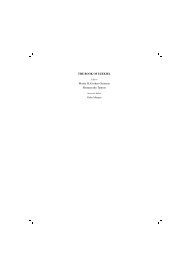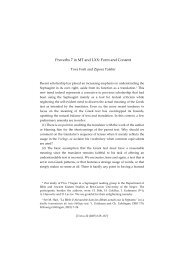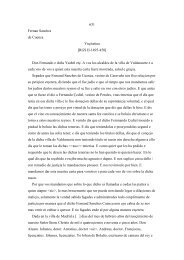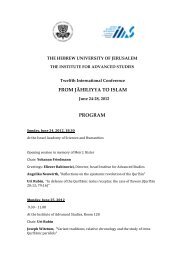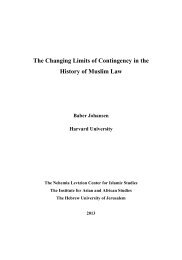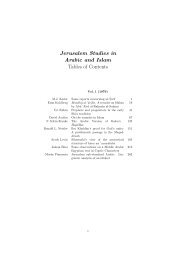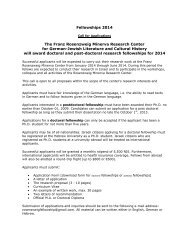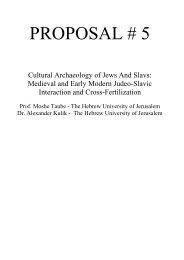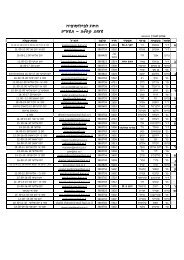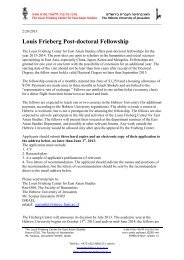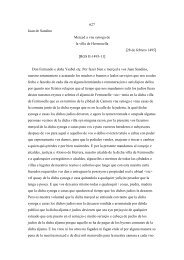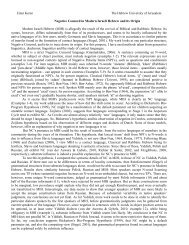Proverbs 7 in MT and LXX: Form and Content
Proverbs 7 in MT and LXX: Form and Content
Proverbs 7 in MT and LXX: Form and Content
Create successful ePaper yourself
Turn your PDF publications into a flip-book with our unique Google optimized e-Paper software.
152<br />
Tova Forti <strong>and</strong> Zipora Talshir<br />
have guessed the mean<strong>in</strong>g, provid<strong>in</strong>g a picturesque description of her<br />
“caus<strong>in</strong>g the hearts of youngmen to flutter,” an image perfectly suited to<br />
the context. 52 The ‘youngmen’ are thus his own contribution. This<br />
completely upsets the balance between the two stichs. However, the<br />
translator did not use it as an opportunity to <strong>in</strong>troduce a new idea or<br />
advance nuances that are not already there <strong>in</strong> his Vorlage.<br />
Verse 11<br />
& <br />
1 *- <br />
+& 7<br />
+ @"$. 1<br />
> *<br />
Verse 11 goes on with the characterization of the woman. She is described<br />
as & (RSV: “loud <strong>and</strong> wayward”; NJPS: “bustl<strong>in</strong>g <strong>and</strong> restive”)<br />
(11a), traits that result <strong>in</strong> her never be<strong>in</strong>g at home (11b). 53<br />
The contents <strong>and</strong> structure of the verse are fairly reflected <strong>in</strong> the<br />
translation. The translator on his part found particular def<strong>in</strong>itions for this<br />
type of a woman: & “<strong>and</strong> she is fickle <strong>and</strong><br />
debauched.” 54 For ‘dwell’ he <strong>in</strong>troduces *- ‘rest’, which may<br />
52 Aga<strong>in</strong>, one does not need to look for a variant text <strong>in</strong> order to underst<strong>and</strong> how<br />
the translator came up with the picture he chose to draw. Mezzacasa, Proverbi, 130,<br />
offers the read<strong>in</strong>g from , ‘to fly’. Lagarde, Anmerkungen, 26, th<strong>in</strong>ks of<br />
. See also Baumgartner, Étude critique, 76–78. The Vulgate, read<strong>in</strong>g: parata ad<br />
capiendas animas, ‘ready to catch hearts’, may be expla<strong>in</strong>ed as derived from <br />
‘besiege’ or % ‘hunt’. See also the imagery that describes the woman as sett<strong>in</strong>g<br />
traps <strong>in</strong> Qoh 7:26 <strong>and</strong> Sir 9:3; 26:22.<br />
53 The stupid woman is similarly def<strong>in</strong>ed as ‘bustl<strong>in</strong>g about’ <strong>in</strong> Prov 9:13.<br />
54 & ‘animate’, is used <strong>in</strong> the <strong>LXX</strong> aga<strong>in</strong> only <strong>in</strong> Cant 6:5 ‘For<br />
they overwhelm me’. ‘unruly’—used only here <strong>in</strong> the <strong>LXX</strong>—is perfectly<br />
suitable as counterpart for &. Commentators have suggested that & should be<br />
corrected <strong>in</strong>to &; cf. Song 3:2 ( & <br />
“I must rise <strong>and</strong> roam the town, Through the streets <strong>and</strong> through the<br />
squares; I must seek the one I love.”



